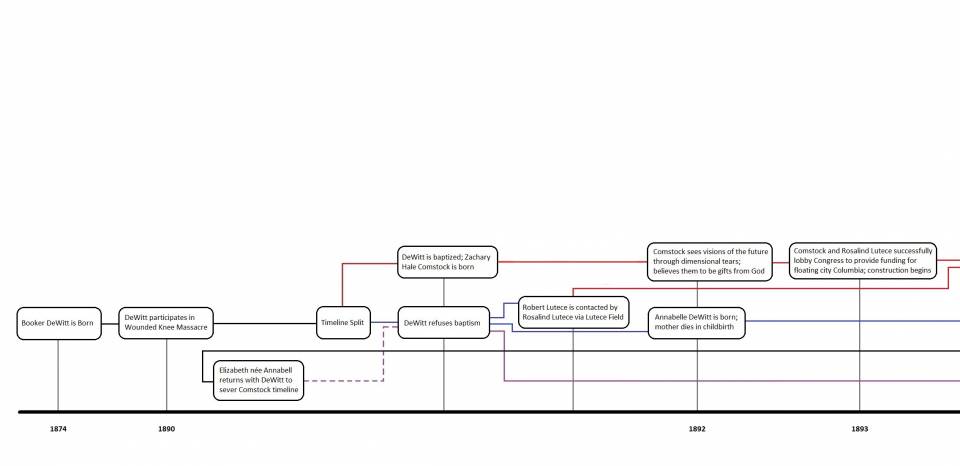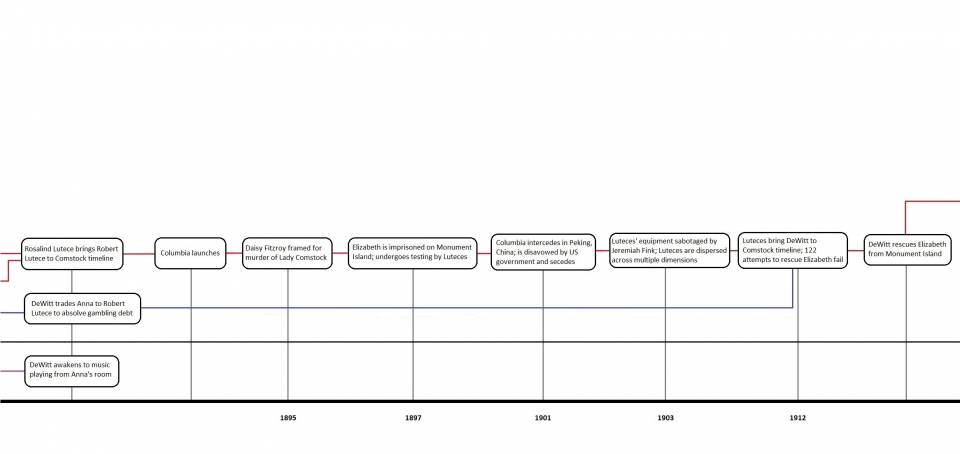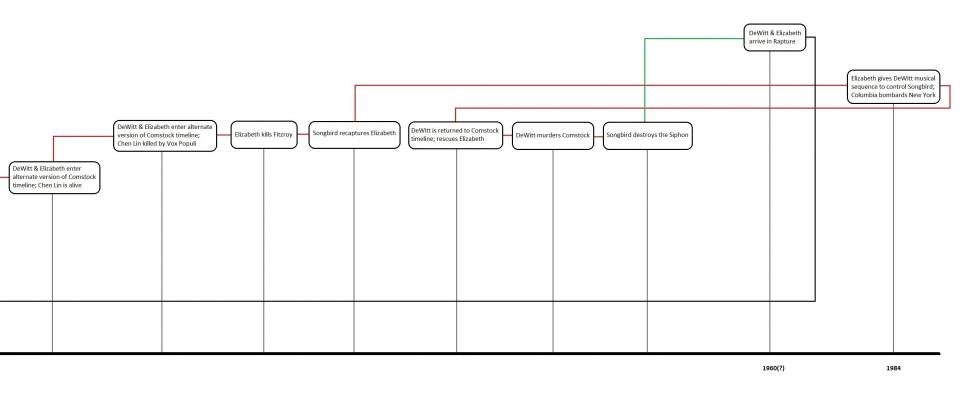As the resident BioShock Infinite obsessors, @ghostiet, @golguin and I thought it might be handy to have a one-stop-shop for the most prevalent BioShock Infinite questions. Keep in mind this is a WIP and just the interpretations of some dudes. If you have any questions (or answers) you'd like to add, feel free to post them here.
Disclaimer: Much of what makes BioShock Infinite such a fun game to discuss is its openness to interpretation. With that in mind, know that many of these answers are not based purely on fact, but also on inference, deduction, and a bit of assumption as well. The many different forms of meta-universe theory, and how they may or may not be applied to the narrative of BioShock Infinite, make for a delectable mind-mess that reduces our best reasoned arguments to speculation, at best. Until Ken Levine suddenly decides to be more forthcoming, I'd take anything anyone (especially us) has to say about the ending with a huge grain of salt.
Spoilers, yo
Who is the dead man in the lighthouse?
He is a guard in charge of policing that gateway to Columbia. A note instructing him to stop Booker is left on the table signed "-C" who is most likely Comstock.
What is the point of choosing the bird or the cage?
For Booker and the actual game, nothing in particular. Similar to the coin flip, the Luteces are testing the constants and variables for iteration 123 of their experiment/quest to free Elizabeth.
Where does the number 123 come from?
After the coin flips "heads", Rosalind Lutece makes a mark under the Heads column bringing the total number of flips to 13. However, when the Luteces move out of the way to let Booker pass, the back of the board shows an additional 110 marks under the Heads column. The implication is that the Luteces have brought a Booker to a Columbia at least 122 times before, and that every time he has flipped the coin, it has come up heads.
Who is the woman that addresses Elizabeth as "Annabelle"?
She is a member of a team of Columbia agents, sent to intercept Booker and Elizabeth in accordance to one of Comstock's "prophecies". The "Annabelle" dialogue is her way of verifying the targets before they spring the trap at the ticketing window. While she does not actually understand the true significance of the name, it is possible that Comstock chose it specifically to test the current state of Booker's memories.
Why doesn't Booker remember losing Annabelle / her pinky finger?
Being displaced out of one's dimension has a quasi-amnesiatic effect where the mind of the individual struggles to create new memories to reconcile this change. The Luteces take advantage of this by providing Booker with subtle cues that transform his memories of giving away Annabelle ("Bring us the girl...and wipe away the debt") to new memories of his mission to rescue Elizabeth.
How can Booker and Comstock exist at the same time? Why isn't there a time paradox?
While Booker and Comstock are the same person (they are both Booker DeWitt, born April 19, 1874), they are not the same person. BioShock Infinite is not a story about time travel, it is a story about inter-dimensional travel. Following the many-worlds interpretation of quantum mechanics with a sci-fi twist, a different dimension exists for every possible variable. Booker and Comstock inhabit different dimensions that reflect the split in the timeline that occurs when he chooses either to accept baptism or reject baptism.
What are the Luteces?
The Luteces are two instances of the same person inhabiting different dimensions. Much like Booker and Comstock, Robert and Rosalind Lutece are the result of a split in the timeline when he/she was born as either a male or a female.
Why does Comstock look so much older than Booker if they're the same age?
Comstock's accelerated age, aggressive cancer, and sterility are all a result of his overexposure to multiple dimensions via tears.
How does Comstock create/come to rule Columbia?
Shortly after the baptism, Comstock has a prophetic vision of the floating city, Columbia. Whether this vision simply comes via a tear or an actual message delivered by an "angel" (who may or may not be an alternate Elizabeth), it provides him with enough information to formulate a plan for Columbia's construction. He brings this plan, along with Lutece's research, to the US government whom he convinces to provide the funding necessary to build the floating city. This culminates in the city's launch at the World's Faire: Columbian Exposition in 1893 as a symbol of American supremacy.
Over the next 8 years, Comstock builds up a cult of personality around himself amongst the citizens of Columbia. In 1901, he commands the city to attack Peking in response to the Boxer Rebellion. The government disavows his actions and orders the city recalled but, at that point, his grip on the populous is too strong and Columbia instead secedes from the US.
Where do the Luteces and Elizabeth get their powers?
The Luteces' equipment is sabotaged by Jeremiah Fink. However, rather than die, they are dispersed across multiple dimensions. This provides them with a sort of omniscience but no way to exert any real change on their own, hence their need for Booker.
Because she lost a part of her finger as an infant when traveling into Comstock's dimension, Elizabeth technically exists in two dimensions simultaneously. Her powers are a manifestation of the multiverse trying to right this cosmic error. The siphon keeps her powers in check up until its destruction, at which point she gains full omnipotence.
Who are the odd men with large metal helmets in Comstock House?
Boys of Silence are part of the surveillance/security system of Columbia. Born blind, they are outfitted with helmets designed to amplify their sense of hearing.
Why does Booker become Comstock? How does baptism turn him into a religious zealot and racist?
The answer to this is twofold. The religious zealotry comes from the visions that he believes are gifts from god in the form of prophecy, but are actually glimpses into alternate dimensions via tears. Everything he does, from raising Columbia, to kidnapping Elizabeth, to his endgame of a New York on fire, is a result of his attempt to fulfill these visions.
The racism ties in to one of the underlying themes of BioShock Infinite, forgiveness of oneself. The baptism is an attempt by Booker to come to terms with the atrocities committed at Wounded Knee. However, regardless of whether or not he accepts baptism, he is unable to forgive himself. In the "rejects baptism" reality this sense of guilt manifests itself in his horrible alcoholism and gambling debt. In the "accepts baptism" reality, Comstock forces himself to see non-whites as subhuman to make their wholesale slaughter more palatable in his mind.
"Comstock feels self-loathing for himself due to his implied Native American lineage - there are two recordings which heavily imply this. The first one has Comstock complaining that he was suspected of being mixed-race, which completely outrages him. The second is a recording of Preston E. Downes talking how he met the martyr!Booker. The recording states that Booker knows Sioux, which is how he helps him communicate with an Indian boy." -Ghostiet
What happened at the end / what does the post-credits sequence mean? (NOTE: the following are different takes on a similar interpretation of the ending but completely theoretical, we could all be way off the mark)
"Remember that the BioShock Infinite multiverse operates on the ideas of constants (bird or cage) and variables (heads). Elizabeth uses her god-like powers to excise the accepts baptism/becomes Comstock variable from existence, effectively leaving the multiverse at infinity-1. An event that was once a variable (accepts baptism or rejects baptism) is now a constant. Without a Comstock to create her, the Elizabeths fade from existence. The rejects baptism/has Annabelle reality remains unchanged, as Booker reawakens in 1893 with his life as it was, outside of his second (124th?) chance at a life with Anna." -StarvingGamer
"Post-credits Booker wakes up in such confusion due to the multiverse "merging" him with the player!Booker - he now, in some capacity, possesses the knowledge of the successful plight of one of his incarnations. The exact same thing happens when Booker crosses to the universe where he became a martyr for the Vox Populi - he begins to remember things done by the incarnation native to the reality he crossed into. Similarly, this is the reason why Booker bleeds from his nose whenever he speaks with Comstock.
Booker being sent "back" by Old Elizabeth doesn't change time, but moves him back to the junction point of "Booker arrived in time" and "Booker came too late". When Elizabeth drowns Booker, she makes a replacement reality to introduce the constant of Booker rejecting baptism - the baptism site is not really the one where Booker made his choice, which is signalyzed by his dialogue." -Ghostiet
"I feel that this is a dispute over the nature of time where I view time as merely a measurement on the state of the universe and what changes have taken place. I see Elizabeth as opening portals to a universe that has the required variables she needs and the amount of change needed to arrive at her solution. The babtism at the end doesn't happen in any "past" experience by a single Booker. Elizabeth creates a universe that deals with the Comstock variable throughout her multiverse.
Elizabeth's portals leading to specific events have little to do with "time" and more to do with gathering the variables needed to produce a specific result. Opening a tear to the moment Booker gave away Anna to Lutece wasn't an actual place in "time", but instead a situation Elizabeth created to show Booker what's going on. The doors of Booker's office wouldn't lead to different universes as they did in the ending if they were an actual "real" place." -Golguin
What are the parallels between BioShock and BioShock Infinite? "There's always a lighthouse. There's always a man, there's always a city..."
The story of BioShock Infinite is an amalgamation of BioShock 1 & 2.
Both the Rapture dilogy and the story of Columbia begin the same way - a man, implanted with false memories (Booker/Jack) arrives at a lighthouse, from which he is transported into a strange city (Columbia/Rapture) created by a man to whom he has a connection (Comstock, who is Booker from a different reality/Andrew Ryan, who is Jack's "father"). The city is a utopia for a certain type of philosophical and political line of thought (Objectivism/American Exceptionalism).
The general story of Infinite is the same as in BioShock 2: a father (Booker/Delta) needs to save his daughter (Elizabeth/Eleanor) from a crazed parent (Comstock/Sofia Lamb). The parent wants to turn her into a world-bending super-creature (Old Elizabeth/The Utopian).
Similarly, the Little Sisters may also be seen as a version of Elizabeth, while the Songbird is a direct translation of the Big Daddies. Other similarities can be also found - like how Ryan and Comstock murder their mistresses after they make a move against them involving their children.
Understanding Parallel Universes
Timeline




Log in to comment